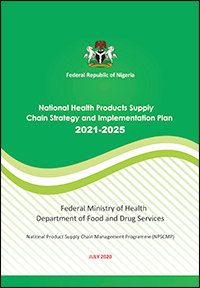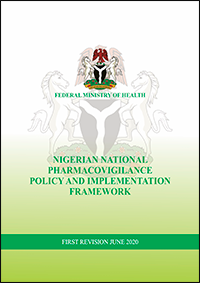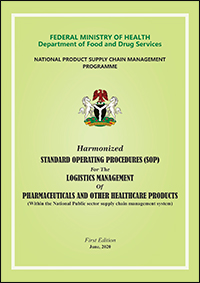Strategic Policy Documents Enhance Health Supply Chain Management in Nigeria
Strategic policy documents enhance health supply chain management in Nigeria
![[Bravo Otohabru, Supply Chain Director of the Resilient and Sustainable Systems for Health (RSSH) project, presents final supply chain policy documents.] {Photo credit: MSH Staff}](https://msh.org/wp-content/uploads/2021/03/rssh_supply_chain_director_bravo_otohabru_715px.png)
“This is a new dawn for health sector supply chain in the country, as these documents will further promote access to quality medicines and enhance universal health coverage.”
Hon. Dr. Osagie Emmanuel Ehanire, Minister of Health, Federal Ministry of Health, Nigeria
On March 4, 2021, at an event attended by government officials at federal and state levels, donor agencies, technical partners, and implementers in the health sector, the Hon. Dr. Osagie Emmanuel Ehanire officially launched integral supply chain policy documents developed in collaboration with MSH and Nigeria under the Resilient and Sustainable Systems for Health (RSSH) project, supported by the Global Fund. All organizations in attendance—which included the World Health Organization (WHO), the US Agency for International Development (USAID), the Clinton Health Access Initiative, state directors of Pharmaceutical Services, and private sector partners—pledged their support to the Health Ministry in the implementation of the policy guidelines.
Let’s take a look at how these documents are set to become the compass and radar of the supply chain system in Nigeria:
1. The National Health Product Supply Chain Strategic Development and Implementation Plan (2021-2025)

Providing direction for medicine supply chain systems in Nigeria for the next four years, this new policy is expected to strengthen governance in supply chain management across the country. The policy will optimize donor intervention through improved coordination among all stakeholders. In developing this document, MSH in collaboration with the National Product Supply Chain Management Programme (NPSCMP), worked with public and private sector actors and donor organizations through a multi-level, multi-disciplinary process aimed at finding localized solutions to supply chain systems that are appropriate and specific to the country. The implementation of the policy will accelerate efficient and effective delivery of medicines and other health products to Nigerians.
Download the Implementation Plan
2. Nigerian National Pharmacogilance Policy and Implementation Framework

MSH’s collaborative work with government entities–the National Agency for Food and Drug Administration and Control (NAFDAC) and the NPSCMP–enabled both regulatory bodies to improve the safety and quality of medicines in the supply chain system. This was achieved through the review of the country’s existing pharmacovigilance policy, which was due for review since 2018. In updating this vital framework, MSH collaborated with the NAFDAC and NPSCMP to address gaps in the pharmacovigilance policy and to reflect current best practices in line with WHO guidelines. A key expectation of the framework is that it will help the national regulatory bodies mitigate risks associated with medicine use, and as such, build trust in medicines, vaccines, and technologies among the Nigerian populace. The implementation framework of the policy is also designed to ensure easy integration of medicines’ safety monitoring practices into the overall health care delivery system since it sets out clear targets that encourage collaboration and cooperation among stakeholders, which is particularly important as COVID-19 vaccines are introduced and monitored.
3. Harmonized Standard Operating Procedures (SOP) for the Logistics Management of Pharmaceuticals and other Healthcare Products

In the bid to advance an integrated approach to managing the supply chain for effectiveness and efficiency, through RSSH, MSH helped finalize the signed copy of a systematized standard operating procedure (SOP) for the supply chain of health commodities in Nigeria. Prior to this, different health programs had separate SOPs. The national SOP contains 12 SOPs and 5 guidelines for managing all public health commodities, including vaccine and nutrition products. Managing health products in line with the provisions of the SOP guidelines will ensure that the right products are delivered to the right client, at the right time. The document, which is the first of its kind, will better organize reviews and updates by all health programs in Nigeria.
4. Harmonized National Quality Assurance/Quality Control Guidelines
Recognizing the importance of having quality assured health products across all programs in Nigeria, MSH collaborated with the NAFDAC, NPSCMP, and national health programs and their corresponding implementing partners to develop the first integrated national quality assurance/quality control guidelines for public health commodities. Incorporated in the guidelines is the annual schedule for sampling and testing. In addition, a joint memorandum of understanding was signed between the NAFDAC and the national programs for sampling and testing when using NAFDAC ISO-certified laboratories. Due to the development of these guidelines, it is expected that Nigerians will have access to the highest quality products within the supply chain system for optimal therapeutic outcome.